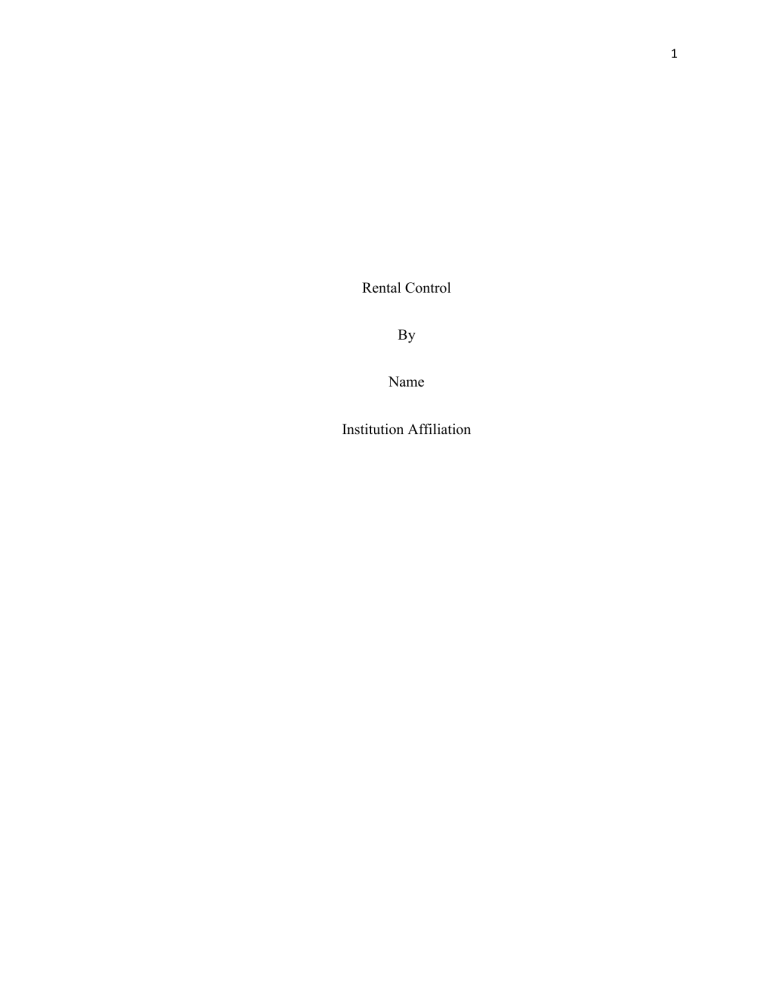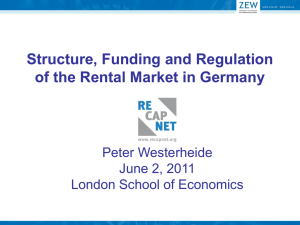
1 Rental Control By Name Institution Affiliation 2 Is rental Control a Good Move? Literature Review Rental controls have a significant boost on the tenant's financial savings. According to a study done by Stein and Gregory (2019), most tenants are subjected to increased spending and a hefty lifestyle that leave their pockets at "risk." Renters often support rent control regulations since they restrict the amount of legal rise. Some rental homes might increase by 9% each year, making it impossible for tenants to stay in them without a big raise or a job move. Rent control can also help renters maintain financial security. They may create better long-term plans when they understand their rental will not increase considerably each year. As a result, putting rental control in place is a wise decision for clients.1 The rental regulations have a greater lease renewal guarantee. Rents are capped; thus tenants are considerably more inclined to commit to a long-term lease. Stepping out would put their future house at danger of a large price rise. Since existing occupants are likely to renew their leases, owners would not have to deal with gaps yearly (Diamond et al. 2019). Occupancy spells waste landlords a great deal of money, in addition to the cost of turning the property over (which is over $2,500 on average).. One can avoid these fees by maintaining the same tenants for a few years. Hence, the landlords are essentially the consumers of the rental controls. The rental Control is, therefore, an excellent move to the landlords2 Notes 1 Stein, Gregory M. "Inequality in the Sharing Economy." Brook. L. Rev. 85 (2019): 787. 2 Scheba, Andreas, and Ivan Turok. "Informal rental housing in the South: dynamic but neglected." Environment and Urbanization 32, no. 1 (2020): 109-132. 3 There is always a little or no incentive at all to upgrade home when it comes to rental cocontrol. Landlords frequently upgrade their homes and equipment every few years to maintain their renters or attract new ones. When a house has improved appliances and other improvements, the rental fee can frequently be increased to reflect the additional conveniences. It's the same if you have a pool or a spare parking spot3. The motivation to renovate a house falls substantially when rent control regulations are in effect. Even if you replace all kitchen appliances with stainless steel and have all new carpets installed, you will be restricted to the annual increase allowed by law. In this situation, landlords are more likely to maintain the same equipment until they break down, at which point they will be replaced with a comparable or less expensive model. Hence, rental Control is not a good move for the landlords. Rental controls result in price fall below the market price. Rent-controlled flats and homes tend to be less expensive than market rentals. The longer the apartment is under rent control, the more behind it will fall4. This means that landlords will not make as much money as they might from their homes. One of the primary reasons why people make investments is indeed the long-term financial benefit. According to Oust (2018), when rents are limited to a certain amount, it is more difficult to fulfil financial goals. They could decide not to invest at all in the first place. Additionally, they will have less money to fund necessary property upkeep and would most likely postpone it as long as feasible. When a home becomes empty (as well as during tenancy), the required repairs and touch-ups can quickly subtract from the monthly rental revenue. Rent control is therefore not a good move for the landlord. 4 The older buildings are the target of rent restrictions. Although rent control is generally beneficial to tenants, tenants should be aware that the majority of rent-controlled buildings are older apartments. While you may save money on rent, you will not have access to the same amenities as residents in non-rent-controlled units (Turner 2020). The majority of existing rent control laws applies to flats constructed before to the 1960s. You could be out of luck if you have your heart set on an improved apartment or a freshly constructed property. This, therefore, becomes a disadvantage to the landlords making the rent controls not to be a good move for the landlords. The rental limits deter investors from concentrating their efforts on the structures. Rent control laws make it harder for investors and developers to build new homes and apartments. Why start building during the first instance if the component they want to finish would've been susceptible to such legislation? They won't charge whatever they want, and it will take years to recoup enough income to make it worthwhile. Therefore, rent control is not a good move for the investors (Millslap, 2018). Regarding the literatures therefore, I am for the idea that rental control is not a good move for the occupants and landlords as well as the investors. Notes 3 Christophers, Brett. "Mind the rent gap: Blackstone, housing investment and the reordering of urban rent surfaces." Urban Studies (2021): 00420980211026466 4 Diamond, Rebecca, Tim McQuade, and Franklin Qian. "The effects of rent control expansion on tenants, landlords, and inequality: Evidence from San Francisco." American Economic Review 109, no. 9 (2019): 3365-94. 5 Bibliography Christophers, Brett. "Mind the rent gap: Blackstone, housing investment and the reordering of urban rent surfaces." Urban Studies (2021): 00420980211026466. Diamond, Rebecca, Tim McQuade, and Franklin Qian. "The effects of rent control expansion on tenants, landlords, and inequality: Evidence from San Francisco." American Economic Review 109, no. 9 (2019): 3365-94. Millsap, Adam. "The Economics of Rent Control." Available at SSRN 3272490 (2018). Oust, Are. "The end of Oslo's rent control: Impact on rent level." (2018). Scheba, Andreas, and Ivan Turok. "Informal rental housing in the South: dynamic but neglected." Environment and Urbanization 32, no. 1 (2020): 109-132. Stein, Gregory M. "Inequality in the Sharing Economy." Brook. L. Rev. 85 (2019): 787. Turner, Margery Austin. "Moderating Market Pressures for Washington, DC, Rental Housing." In Rent Control, pp. 110-124. Routledge, 2020.


